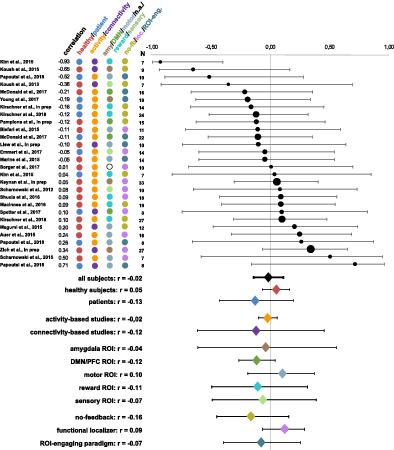当前位置:
X-MOL 学术
›
Hum. Brain Mapp.
›
论文详情
Our official English website, www.x-mol.net, welcomes your
feedback! (Note: you will need to create a separate account there.)
Can we predict real-time fMRI neurofeedback learning success from pretraining brain activity?
Human Brain Mapping ( IF 3.5 ) Pub Date : 2020-07-30 , DOI: 10.1002/hbm.25089 Amelie Haugg 1, 2 , Ronald Sladky 2 , Stavros Skouras 3 , Amalia McDonald 4 , Cameron Craddock 5 , Matthias Kirschner 1, 6 , Marcus Herdener 1 , Yury Koush 7 , Marina Papoutsi 8 , Jackob N Keynan 9 , Talma Hendler 9 , Kathrin Cohen Kadosh 10 , Catharina Zich 11 , Jeff MacInnes 12 , R Alison Adcock 13 , Kathryn Dickerson 13 , Nan-Kuei Chen 14 , Kymberly Young 15 , Jerzy Bodurka 16 , Shuxia Yao 17 , Benjamin Becker 17 , Tibor Auer 10 , Renate Schweizer 18 , Gustavo Pamplona 19 , Kirsten Emmert 20 , Sven Haller 21 , Dimitri Van De Ville 22, 23 , Maria-Laura Blefari 22 , Dong-Youl Kim 24 , Jong-Hwan Lee 24 , Theo Marins 25 , Megumi Fukuda 26 , Bettina Sorger 27 , Tabea Kamp 27 , Sook-Lei Liew 28 , Ralf Veit 29 , Maartje Spetter 30 , Nikolaus Weiskopf 31 , Frank Scharnowski 1, 2
Human Brain Mapping ( IF 3.5 ) Pub Date : 2020-07-30 , DOI: 10.1002/hbm.25089 Amelie Haugg 1, 2 , Ronald Sladky 2 , Stavros Skouras 3 , Amalia McDonald 4 , Cameron Craddock 5 , Matthias Kirschner 1, 6 , Marcus Herdener 1 , Yury Koush 7 , Marina Papoutsi 8 , Jackob N Keynan 9 , Talma Hendler 9 , Kathrin Cohen Kadosh 10 , Catharina Zich 11 , Jeff MacInnes 12 , R Alison Adcock 13 , Kathryn Dickerson 13 , Nan-Kuei Chen 14 , Kymberly Young 15 , Jerzy Bodurka 16 , Shuxia Yao 17 , Benjamin Becker 17 , Tibor Auer 10 , Renate Schweizer 18 , Gustavo Pamplona 19 , Kirsten Emmert 20 , Sven Haller 21 , Dimitri Van De Ville 22, 23 , Maria-Laura Blefari 22 , Dong-Youl Kim 24 , Jong-Hwan Lee 24 , Theo Marins 25 , Megumi Fukuda 26 , Bettina Sorger 27 , Tabea Kamp 27 , Sook-Lei Liew 28 , Ralf Veit 29 , Maartje Spetter 30 , Nikolaus Weiskopf 31 , Frank Scharnowski 1, 2
Affiliation

|
Neurofeedback training has been shown to influence behavior in healthy participants as well as to alleviate clinical symptoms in neurological, psychosomatic, and psychiatric patient populations. However, many real‐time fMRI neurofeedback studies report large inter‐individual differences in learning success. The factors that cause this vast variability between participants remain unknown and their identification could enhance treatment success. Thus, here we employed a meta‐analytic approach including data from 24 different neurofeedback studies with a total of 401 participants, including 140 patients, to determine whether levels of activity in target brain regions during pretraining functional localizer or no‐feedback runs (i.e., self‐regulation in the absence of neurofeedback) could predict neurofeedback learning success. We observed a slightly positive correlation between pretraining activity levels during a functional localizer run and neurofeedback learning success, but we were not able to identify common brain‐based success predictors across our diverse cohort of studies. Therefore, advances need to be made in finding robust models and measures of general neurofeedback learning, and in increasing the current study database to allow for investigating further factors that might influence neurofeedback learning.
中文翻译:

我们可以通过预训练大脑活动来预测实时功能磁共振成像神经反馈学习的成功吗?
神经反馈训练已被证明可以影响健康参与者的行为,并减轻神经、心身和精神病患者群体的临床症状。然而,许多实时功能磁共振成像神经反馈研究报告称,学习成功率存在巨大的个体差异。导致参与者之间巨大差异的因素仍然未知,识别这些因素可以提高治疗的成功率。因此,我们在这里采用了荟萃分析方法,包括来自 24 项不同神经反馈研究的数据,共有 401 名参与者(包括 140 名患者),以确定在预训练功能定位器或无反馈运行期间目标大脑区域的活动水平是否存在变化(即,在没有神经反馈的情况下的自我调节)可以预测神经反馈学习的成功。我们观察到功能定位器运行期间的训练前活动水平与神经反馈学习成功之间存在轻微的正相关性,但我们无法在不同的研究队列中识别出常见的基于大脑的成功预测因素。因此,需要在寻找一般神经反馈学习的稳健模型和测量方面取得进展,并增加当前的研究数据库以允许研究可能影响神经反馈学习的进一步因素。
更新日期:2020-09-03
中文翻译:

我们可以通过预训练大脑活动来预测实时功能磁共振成像神经反馈学习的成功吗?
神经反馈训练已被证明可以影响健康参与者的行为,并减轻神经、心身和精神病患者群体的临床症状。然而,许多实时功能磁共振成像神经反馈研究报告称,学习成功率存在巨大的个体差异。导致参与者之间巨大差异的因素仍然未知,识别这些因素可以提高治疗的成功率。因此,我们在这里采用了荟萃分析方法,包括来自 24 项不同神经反馈研究的数据,共有 401 名参与者(包括 140 名患者),以确定在预训练功能定位器或无反馈运行期间目标大脑区域的活动水平是否存在变化(即,在没有神经反馈的情况下的自我调节)可以预测神经反馈学习的成功。我们观察到功能定位器运行期间的训练前活动水平与神经反馈学习成功之间存在轻微的正相关性,但我们无法在不同的研究队列中识别出常见的基于大脑的成功预测因素。因此,需要在寻找一般神经反馈学习的稳健模型和测量方面取得进展,并增加当前的研究数据库以允许研究可能影响神经反馈学习的进一步因素。











































 京公网安备 11010802027423号
京公网安备 11010802027423号